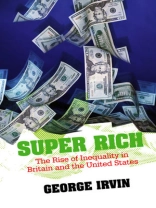In the past 25 years, the distribution of income and wealth in Britain and the US has grown enormously unequal, far more so than in other advanced countries. The book, which is aimed at both an academic and a general audience, examines how this happened, starting with the economic shocks of the 1970s and the neo-liberal policies first applied under Thatcher and Reagan. In essence, growing inequality and economic instability is seen as driven by a US-style model of free-market capitalism that is increasingly deregulated and dominated by the financial sector.
Using a wealth of examples and empirical data, the book explores the social costs entailed by relative deprivation and widespread income insecurity, costs which affect not just the poor but now reach well into the middle classes. Uniquely, the author shows how inequality, changing consumption patterns and global financial turbulence are interlinked.
The view that growing inequality is an inevitable consequence of globalisation and that public finances must be squeezed is firmly rejected. Instead, it is argued that advanced economies need more progressive taxation to dampen fluctuations and to fund higher levels of social provision, taking the Nordic countries as exemplary. The broad political goal should be to return within a generation to the lower degree of income inequality which prevailed in Britain and the US during the years of post-war prosperity.
Содержание
Introduction.
1 Neo-liberalism and the Return of Inequality.
2 Do we need Fat Cats?.
3 The Rise of Neo-liberalism.
4 America, Europe and the Welfare State.
5 Happiness and Pareto.
6 What about the middle class?.
7 The Growing Cost of Inequality.
8 Is the Consumption Binge sustainable?.
9 In Defence of Equality.
Bibliographical references.
Об авторе
George Irvin is Professorial Research Fellow at SOAS, University of London.












